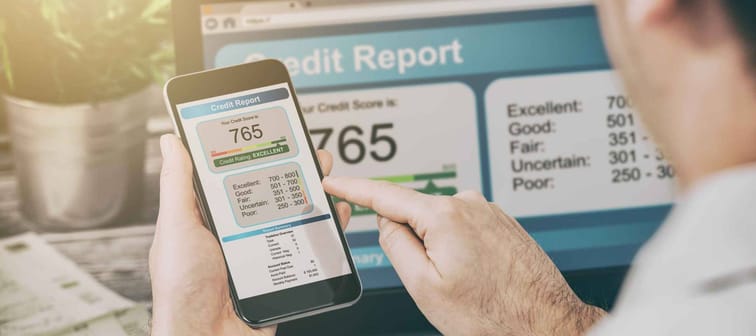Credit scores 101
Before we dig into credit score averages, let’s go back to basics with a quick refresher.
What is a credit score?
A credit score is a 3-digit number that gives others a sense of your creditworthiness based on your credit history. On a high level, your credit history is a collection of:
- your history of paying bills
- how much and what type of debt you have
- how long you have been using or have had access to credit (e.g., a credit card)
A credit score is an important part of your financial and credit health. It can do a lot for you if managed properly. While there are different types of credit score calculations used to create your score, credit scores typically range from 300-900. The higher, the better.
Why is your credit score important?
Your credit score influences your access to things like financial products (loans, credit cards), housing (mortgages, rental contracts), and the job market. A lender, prospective employer, or potential landlord may ask to see your credit score or do some sort of credit check.
If you have a bad credit score, you can be denied these services or forced to pay higher rates on a personal loan or mortgage, or be denied premium credit cards.
More: Best credit cards for bad credit
Who gives you your credit score?
In Canada, there are two credit bureaus that provide you with a credit score, Equifax and TransUnion. They leverage public records and information from banks, collection agencies, credit issuers, etc., to determine what your credit score should be.
The two use slightly different credit scoring models and so their outputs will be slightly different as a result. But a score from one firm is no better than a score from the other.
Whoever is asking for your credit score will determine which company you will need a credit score from—some organizations work with Equifax, others with TransUnion.
How is your credit score calculated?
While TransUnion and Equifax use different models to calculate a credit score, there are several common factors they consider:
- payment history (~35%)
- the amount of credit you use vs. the amount you have access to, known as credit utilization (~30%)
- length of credit history (~15%)
- number of hard checks (~10%)
- type of credit used (10%)
For a full breakdown of what determines your credit score, check out our Ultimate guide to credit scores.
Where to find your credit score
You can access your credit score multiple ways in Canada. Equifax and TransUnion both offer one free credit report per year, but you’ll need to pay a small fee to access your score with them. Credit score checks can also be done via free services like Borrowell or Credit Karma.
(Note: In addition to credit scores, Borrowell also offers lending services up to $35,000. For more info, read our Borrowell loans review.)
More: Where to get a free credit score
What is the average Canadian credit score?
A 2021 survey by Borrowell puts the average Canadian credit score around 667, up slightly from the commonly quoted average of 650. That means most Canadians are at the high end of the “fair” category, according to both TransUnion and Equifax.
What can you do with a fair credit score?
With a fair score, you’ll be able to get a standard interest rate and terms on credit products from a financial institution (like a bank). While you may not have issues getting certain loans (such as a personal loan or car loan), or specific credit cards with a fair score, you won’t receive the lowest interest rates on credit. Some credit cards with premium rewards and perks may also be out of reach.
The good thing about a fair score is that it can be improved with small changes to reach a good or better score.
More: Best credit cards for fair credit scores
Average credit scores by province/territory
Like incomes, credit scores differ across Canada. This isn’t so much a reflection of poor credit management by residents of certain provinces, but more likely affected by other factors such as local cost of living, consumer debt levels, available job opportunities, and a high population of youth or new immigrants who haven’t yet been able to build up their credit score.
Borrowell’s data puts Ontario, British Columbia and Quebec at the top end for credit scores, with Markham, Ontario, holding the highest average, at 715.
See below for a breakdown of Borrowell’s top 20 cities’ average credit scores.
| Province | City | Average Credit Score |
|---|---|---|
| Ontario | Markham | 715 |
| British Columbia | Vancouver | 703 |
| British Columbia | Burnaby | 697 |
| Ontario | Toronto | 694 |
| British Columbia | Victoria | 691 |
| Quebec | Montreal | 690 |
| Ontario | Mississauga | 690 |
| Ontario | Ottawa | 685 |
| British Columbia | Surry | 668 |
| Quebec | Quebec City | 668 |
| Ontario | Brampton | 667 |
| Alberta | Calgary | 665 |
| Ontario | London | 665 |
| Nova Scotia | Halifax | 658 |
| Manitoba | Winnipeg | 657 |
| Saskatchewan | Saskatoon | 656 |
| Saskatchewan | Regina | 654 |
| Ontario | Hamilton | 653 |
| Alberta | Edmonton | 645 |
| New Brunswick | Moncton | 632 |
Average credit scores by age in Canada
Credit scores tend to increase by age. On its own, age does not bias towards a low or bad credit score but because of the way credit scores are calculated, as you age, your credit score improves.
Remember, the major factors that influence your score relate to credit history, credit mix, and credit utilization. As you grow older, you’re more likely to make the types of purchases that require different types of credit (mortgage, car loan, or revolving credit) and pay down credit like student loans. This changes the mix of credit you use and extends your credit history.
As you age, you are also more likely to reduce the amount of credit you use, versus the amount of credit you have access to. This impacts your credit utilization.
Below are the average credit scores by age in Canada, according to a 2018 Equifax survey.
| Age Range | Average Credit Score |
|---|---|
| 18 - 25 | 692 |
| 26 - 35 | 697 |
| 36 - 45 | 710 |
| 46 - 55 | 718 |
| 56 - 65 | 737 |
| 65+ | 750 |
Credit scores in Canada vs. other countries
There is no global standard credit system for evaluating individual creditworthiness. While some countries operate on similar credit systems as Canada, every nation has different methods of evaluating credit history.
The U.S is most similar to Canada, as they share comparable methodologies and utilize three-digit scores provided by TransUnion and Equifax. The U.K. also operates on a credit scoring system that is delivered by Equifax and TransUnion. Despite these similarities, every country is different.
Does your Canadian credit score follow you if you move abroad?
Since there is no global standard for evaluating credit, you can’t take your credit score with you, no matter how good (or bad) it is. However, some financial institutions in other countries may acknowledge your foreign credit history, so having a Canadian credit file may be helpful.
If you plan to move abroad, assume that your Canadian credit history will not carry over (sorry, even if it is excellent credit). As a result, it’s a good idea to research and understand the credit assessment methodology of your new home. And even though different countries operate different credit score systems, one thing will stay consistent: they all tend to require a history of good credit to get the best prices on credit products.
Does your foreign credit history follow you to Canada?
A foreign credit score will not transfer to Canada. Even if you are a dual Canadian and U.S. citizen residing in the U.S and would like to move to Canada, you will need to build credit in Canada and cannot use your U.S.-based score.
How to increase your credit score
If you’re like the average Canadian, with only a fair credit score, you may want to work at raising it. But how? Credit repair sounds daunting, but small changes can make a big difference, even if you are a minimum wage worker on a student loan. Here are some ideas:
Pay your bills on time and consistently
Paying your bills on time is one of the best ways to improve your credit score. A missed payment can significantly impact your score so staying on top of this is crucial.
Create a calendar (on paper or on your phone) detailing when all your bills are due, from your credit card to your utility bills, so you don’t miss a payment. If you know when everything is due, you can even pay the bills a few days in advance.
This is especially important for new installment credit products like “buy now pay later.” Installment credit product payments are sometimes easy to miss—impacting your credit score and resulting in a late payment penalty. Reducing your credit card debt overall will make this easier.
More: Buy now, pay later: what to know about installment plans
Reduce your credit utilization ratio
The amount of credit you use versus the amount you have access to impacts your score. Therefore, be sure to reduce your overall household debt (including mortgage debt), use less of your available credit, and leverage strategic opportunities to increase the amount of credit you have (without using it). A few ways to do this:
- spend below the credit limit on your current credit card
- accept credit limit increases offered by banks while keeping your spending on your credit card the same
- gradually increase the number of credit cards you have over time—but don’t go applying for multiple new credit cards at once, as that will hurt your score
More: How many credit cards should I have?
Don’t make credit checks unless you need to
There are two types of credit checks that can be made into your credit history: a soft check and a hard check. A soft check is typically done by you, a prospective landlord, or employer and doesn’t affect your credit score. It doesn’t act as an actual assessment of your credit and is done for information purposes only.
A hard check, however, is done to evaluate the risk of extending you credit. This is done when you apply for a loan, such as a mortgage. This type of credit check shows up on your credit report every time it’s done, which can negatively impact your score. Your score can decrease if you do too many hard checks.
More: Does checking your credit score hurt your credit?
A credit bureau typically allows for a hard check grace period when you’re shopping around for credit products like mortgages at financial institutions. These types of credit checks don’t show up as multiple hard credit checks. However, this does not extend to credit cards, so if you’re a credit card churner, be aware.
Overall, monitoring your credit score, either via one of the bureaus or a third party like Borrowell or Credit Karma, is a good idea if you’re working to turn a bad credit score to good. Just remember to watch the number of hard checks made on your credit history.
All thoughts and opinions expressed by the author and are his own and not those of his current employer.
More: Reboot your credit score in 4 weeks or less
More: What credit card should you have at your income level?
More: 6 necessary steps to repaire your credit after bankruptcy






